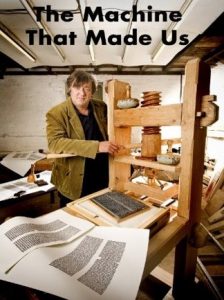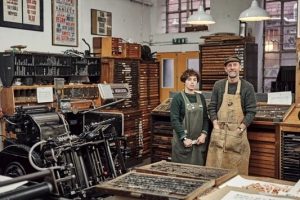[Adapted from a talk given at our launch event in Autumn 2021]
It’s quite unusual for a print shop to be completely fitted with equipment from a single source, but almost everything in our print shop originally belonged to a letterpress printer called Peter Chasseaud, who was working under the imprint of the Tom Paine Printing Press in Lewes, Sussex. Tom Paine lived in Lewes in the 1760s and 70s, and wrote and published his first text there (The Case of the Officers of Excise), 4000 copies of which were printed in Lewes in 1772.
The Tom Paine Printing Press was operating as a shop on the High Street in Lewes, through which Peter sold beautiful letterpress posters and ephemera. Its origin goes back to a BBC4 documentary called The Machine that Made Us, released in 2008. In this documentary, Stephen Fry works with a man called Alan May to recreate the press which Gutenberg would have used. Peter saw the documentary, and commissioned Alan to make him an 18th-century press for the bicentenary of Paine’s death in 2009.

With the support of Arts Faculty Research Directors Martin Hurcombe and Richard Pettigrew, we were able to secure funding to move everything to the University of Bristol, keeping the collection together to inspire new generations of letterpress printers.
It was a race against time to pack everything up and find a removal company who would agree to work during lockdown before the funding deadline expired. In February, Rhiannon drove to Lewes and spent a couple of days trying to identify items on the inventory to determine the size of lorry needed and how best to move everything. Metal type and ornaments are so heavy that even small things like this are at risk of falling out the bottom of cardboard boxes, and if you put more than one thing in a box, it’s too heavy to pick up, hence bundling them in cling film.
Finding a Location in Bristol
While Peter was packing things up in Lewes, we set out to find space on the university campus for the press. This was made possible with particular help from Arts Faculty Manger, Michelle Coupland; The School Managers of Humanities and Modern Languages, Ross Robinson and Anne Payne (who has since retired); the new School of Modern Languages Manager, Heather Williams (who was also a great support in her role as Faculty Research Impact and Knowledge Exchange Manager); and Jackie Shaw in Procurement, who, through many emails and Teams calls, guided us through the particular and peculiar nature of our purchase.
Removals and Setting Up
Once we had the funding in place, we’d found a space in the Faculty, and we had worked out how to pack everything up, there were some pretty serious logistical issues surrounding how we would get a lot of very heavy and wide things into a basement room. When we were starting out in academia, we never imagined that one day we would be measuring doorframes (there are no fewer than eight between the accessible fire exit and the print shop). There was a particularly low point when the removal company suggested we might have to remove some of the doorframes.
That nadir was almost matched when the lorry arrived, and we realised that we’d measured the doorframes but not the gateposts. Luckily, this was during the lockdown, so there was little traffic on Woodland Road.
In the end, we were saved by Alan May himself. We rang him for advice, and he put us in touch with Martin Andrews – the ‘ink man’ in the Stephen Fry documentary, and a retired colleague from University of Reading’s Department of Typography & Graphic Communication. The only solution to the doorways was to completely dismantle the common press, but we didn’t know until the last minute whether it would actually come apart.
Local Letterpress Networks
The foundation of the Bristol Common Press is due in large part to a network of skilled and collaborative letterpress specialists in the UK and beyond.
We’ve forged a close relationship with Nick Hand and Ellen Bills the Letterpress Collective, based in Centrespace Studios in Bristol. The Letterpress Collective is an amazing space which is home to a whole family of printing presses, and a printing bike, no less. We hope there will continue to be many opportunities for collaboration between our two shops.

We’d also like to thank our friends and colleagues in the Centre for Fine Print Research at the University of the West of England, and especially Angie Butler, who is an expert letterpress printer. Her work is immortalised on our Centre for Material Texts banner and posters (and in our Special Collections).
Equally crucial has been our collaboration with Rachel Marsh of Semple Press. Rachel is an experienced letterpress printer of many years and has been our letterpress printshop guide. Rachel was unfailingly patient in helping us become acquainted with the equipment. Without her, we’d have found it much more difficult to turn a huge pile of boxes and mysterious bits of furniture into a usable, hospitable space, and we’d have had a far harder time in working out how to make it all work.








